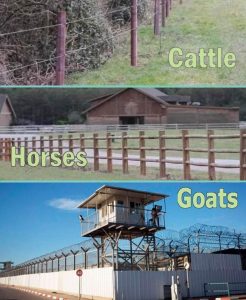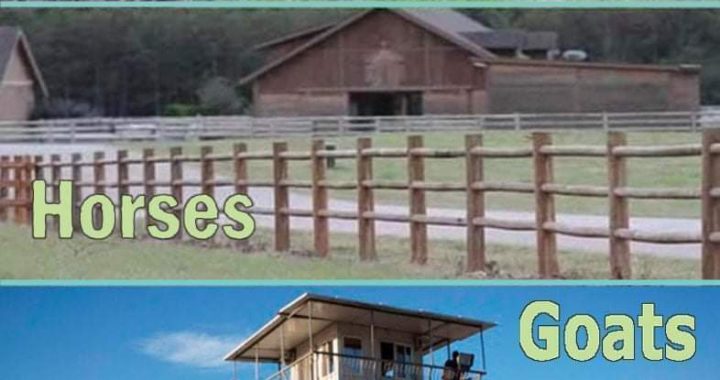
Goat keeping really is mainly about keeping the critters where you want them! Goats are notoriously agile and prone to wandering so it’s important that you have fencing in place when they hit your homestead to ensure they stay put.
On our farm, we have opted for electric livestock fencing mostly because it was a very inexpensive and predator deterring option to start with. As we’ve worked with it we’ve learned that it was an absolutely great choice for our little farm.
The netting fence can be set up by a single person in a half hour – it features step in posts every 8 feet that keep the fence secure yet flexible. If you want to move the goats around your property you just roll up the fence and move it to your new location. You do need an electric fence activator and a copper grounding spike to electrify the fence.
Training the goats to the electric fence was pretty easy, generally once they nose it and get a little zap they try to avoid it. We’ve had some stubborn bucks that did not want to let a little wire stand between him and his potential girlfriends so to keep they boys out, we double the fence and added a 15 to 20 foot buffer zone between the pens.
We purchased our fence from Premiere 1 and have gone back for another 2 rolls to expand our original goat pen to accommodate separating the girls and boys.

Fencing Options for Goats
When it comes to keeping goats, one of the most important considerations is fencing. Goats are notorious escape artists, so having a secure and reliable fence is crucial. Here are some popular fencing options for goats:
- Woven Wire Fencing
- Description: Woven wire fencing is a popular choice for goat owners. It consists of horizontal and vertical wires woven together to create a strong and flexible barrier.
- Pros: Durable, long-lasting, and effective at keeping goats contained. It can also keep out predators.
- Cons: Can be expensive and time-consuming to install.
- Electric Fencing
- Description: Electric fencing uses a mild electric shock to deter goats from touching or climbing the fence.
- Pros: Cost-effective, easy to install, and can be used in combination with other fencing types.
- Cons: Requires regular maintenance to ensure the electric current is working properly. Weeds and vegetation can short out the fence.
- Chain-Link Fencing
- Description: Chain-link fencing is made of interlocking steel wires that form a mesh.
- Pros: Strong, durable, and provides good visibility. It can also be used to create secure enclosures.
- Cons: Can be expensive and may require additional measures to prevent goats from climbing or squeezing through.
- Wooden Fencing
- Description: Wooden fencing consists of wooden posts and rails.
- Pros: Aesthetically pleasing and can be customized to fit the landscape.
- Cons: Requires regular maintenance to prevent rotting and damage. Goats may chew on the wood.
- Portable Electric Netting
- Description: Portable electric netting combines mesh fencing with electric shock capabilities.
- Pros: Ideal for rotational grazing systems, easy to move, and provides robust protection against predators.
- Cons: Can be more expensive than traditional electric fencing and requires regular maintenance


There’s a rare magic in your ability to speak to both the intellect and the heart, leaving the reader with a profound sense of connection.